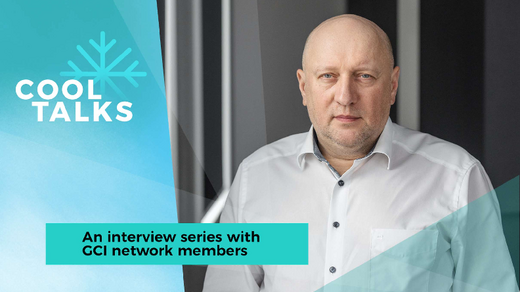For this Cool Talk, we have had the opportunity to interview Ole Marius Moen, research scientist at SINTEF Energy Research. He has a Master of Science in Mechanical Engineering from the Norwegian University of Science and Technology (NTNU). From 2014 until 2020 he has held several positions, as engineer and later senior engineer in TechnipFMC, working mainly with process flow dynamics in subsea oil and gas production. In 2020 he started as a research scientist in SINTEF Energy Research, and his main field of competence lies in high temperature heat pump systems using natural refrigerants.
Why joining the Green Cooling Initiative?
SINTEF has been promoting and working with natural refrigerants since the 1980s and is strongly involved with the revival of CO2 as a refrigerant in cooperation with the Norwegian University of Science and Technology (NTNU). SINTEFs vision is "Technology for a better society" and reflects our vision to conduct research together with our collaborators and customers towards a more sustainable future. In this context, natural refrigerants are the only long-term and sustainable path for the refrigeration and heat pump sector.
How does your entity contribute to making the RAC sector more climate-friendly? / Why are you committed to green cooling technologies?
SINTEF is a non-for-profit research organization and conducts research projects with a focus on energy efficiency of industrial processes, refrigeration systems and heat pumps, including development and testing of components and cycles using exclusively natural refrigerants. Through research projects on national and European level, we prove that natural refrigerants are as competitive to HFC and HFO-based technology in any type of refrigeration or heat pump application.
Where do you see the biggest obstacle for green cooling technologies at the moment?
One of the largest obstacles for green cooling technologies with natural refrigerants is end-user awareness. It is up to us, the refrigeration and heat pump sector, to educate the end-user about the impact of refrigerant choice and the consequences of potential future restrictions on hydrofluorocarbons (HFCs) and hydrofluoroolefins (HFOs). Another obstacle is the cost efficiency of systems with natural refrigerants. There needs to be sufficient supply of natural refrigerant components and systems to obtain parity on costs, comparing to HFC and HFO based systems.
What would an ideal cooling sector look like in the future?
We wish that we as a sector would finally stop going in circles and to stop using new generations of synthetic refrigerants, after which to repeat the same mistakes when a new environmental issue erupts due to the refrigerants we are using.
Furthermore, we hope that the right refrigerant is put to use in the right application. We wish we could make use of the whole spectrum of the natural five: air, water, ammonia, hydrocarbons and CO2. We are convinced that with those five, we can cover all the demand for heat pump and refrigeration applications in the future.
What makes you believe that we will master the transition to Green Cooling?
There is a strong movement in the refrigeration and heat pump sector towards natural refrigerants, with competitive and high-quality products entering or already established on the market. When we started using CO2 for supermarket refrigeration around 1995, the refrigeration society was very skeptical, because of energy efficiency and cost. Now the market penetration shows both energy- and cost efficiency benefits of the systems using natural refrigerants. Furthermore, the push from policy makers towards the phase down of high-GWP refrigerants through the Kigali-amendment, the Montreal protocol, the European F-gas regulation, and the possible ban of PFAS by the European Chemical Agency that can effectively rule out most of HFOs and HFO/HFC blends, makes us believe the transition towards green cooling is inevitable.
Speaking of safety: what would you say to people who think natural refrigerants are too risky to handle?
All in all, it comes down to engineering to reduce the charge of the refrigerants of concern and to develop safe practices around services and handling of equipment. Proper education and training of technicians and service personnel will be the key for the wide implementation and market penetration for natural working fluids.




